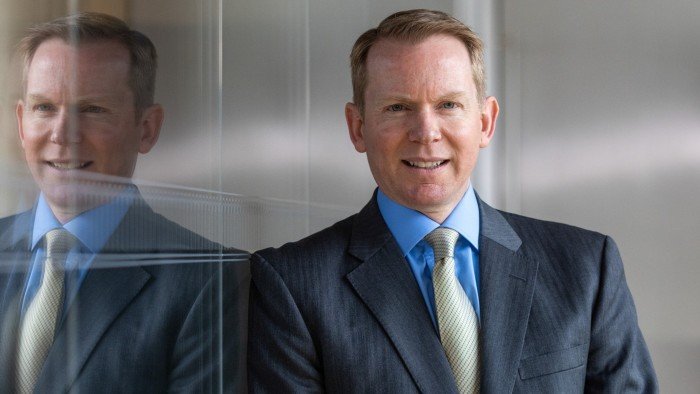Unlock the Editor’s Digest for free
Roula Khalaf, Editor of the FT, selects her favourite stories in this weekly newsletter.
The boss of Lloyds Banking Group has likened forcing pension funds to buy UK assets to “capital controls”, describing it as a “difficult slope” for an open economy.
The government has drafted legislation that would compel large UK pension funds to allocate money to domestic companies, as part of an effort to boost investment and drive economic growth.
“Mandating allocations of pension funds is a form of capital control. I have spent 10 years of my working life in China and many jurisdictions where there are capital controls,” Charlie Nunn told the Financial Times.
“That is a different model and that is a difficult slope for an economy that believes it is an open economy.”
In a strongly worded critique just over a week before UK chancellor Rachel Reeves delivers her latest Mansion House speech, Nunn said that mandating funds would put them “in conflict” with their fiduciary obligations to deliver the best returns for pensioners.
The intervention from the head of Lloyds, the UK’s largest retail bank and owner of pension provider Scottish Widows, reflects the disquiet in the pension industry at the prospect of the government directing how companies allocate their funds.
Allies of Reeves have argued the chancellor does not believe she will ultimately need to exercise the new powers, saying that reforms to make funds bigger and a voluntary agreement by providers to allocate more money to the UK will prove sufficient.
Under an accord signed in May, 17 of the UK’s largest pension providers have pledged to invest at least 5 per cent of their default funds in private British assets by the end of the decade.
Scottish Widows was the only big UK pension provider that refused to sign the accord. Nunn said that Lloyds has already allocated £35bn to investing in British assets.
The government’s efforts to grow the economy should instead focus on tackling the housing crisis and improving Britons’ financial resilience, the Lloyds boss added.
Britain was facing a “housing crisis that has been 40 years in the making”, particularly in regard to affordable homes, with 1.5mn fewer homes available on social rents than in the 1980s, Nunn said ahead of a social housing forum organised by Lloyds on Monday.
The bank, which has lent more than £20bn to the social housing sector, plans to turn one of its older data centres in Pudsey, West Yorkshire, into 124 affordable homes.
Lloyds has set itself a target of supporting 1mn homes at socially affordable rents over the next decade. “I always believe if you’re not ambitious about targets, it’s never going to happen,” said Nunn.
Despite lofty targets — with the government also pledging to build 1.5mn homes in England in the five years to 2029 — the number of homes built last year went backwards, Nunn acknowledged.
Private companies are reluctant to lose money on developments by building into a downturn, while cash-strapped local councils are spending more on retrofits for sustainability, as well as on safety issues caused by cladding, than on building homes.
Nunn called housing a “critical need” for the UK’s growth ambitions. “Because this will drive growth in communities and productivity, it’s very important as a foundation for the UK.”
“We need to do more and we need to do it faster. These are massive issues for people in the UK and they aren’t being resolved quickly enough,” he said.
Nunn also downplayed the impact of a possible cut in the annual tax-free cash Isa allowance, which Reeves is expected to announce in her Mansion House speech next week with the aim of encouraging savers to shift money into UK companies.
“Everyone gets tied up in the cash Isa debate . . . which is relevant for a few rich people if we are honest about it. But that’s not where the problem is, that’s not the way to turn around the economy,” he said.
The Labour government’s retreat last week on welfare reforms stoked fears that the chancellor will ultimately have to increase taxes to plug the hole in the public finances.
There is also unease in the City that the chancellor could boost Treasury coffers by increasing the bank levy — one option included on a leaked memo by deputy prime minister Angela Rayner earlier this year.
Nunn said there had been “no discussions on that” with the government. But he stressed that any increase in the corporation tax rate for banks would “slow down my ability to lend to real customers and support business and growth”.
Nunn said Lloyds took a “glass half full” approach to the economy, although the bank only expects annual growth of about 1 to 1.5 per cent over the next three years.
“The economy is healthier . . . The issue is we don’t have the confidence and the vision to invest, and we are not getting businesses investing in that next stage of growth,” he added.

